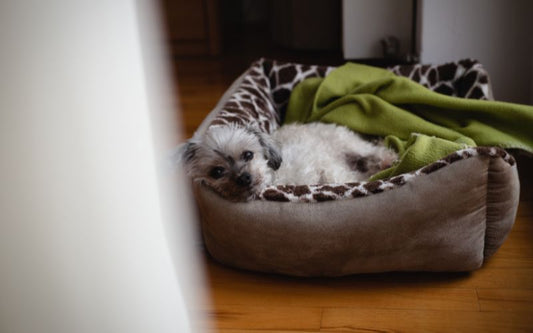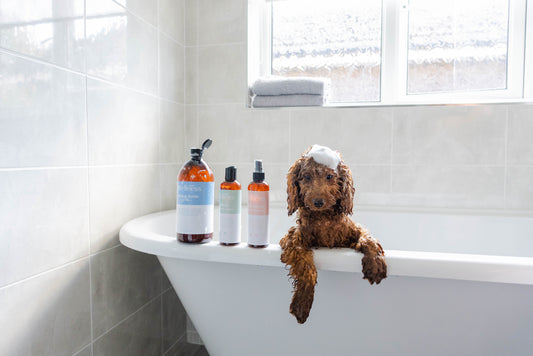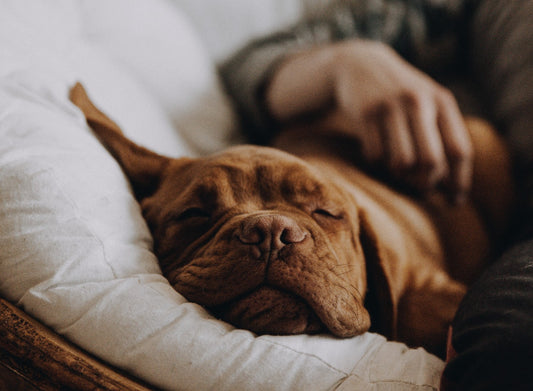National Dog Survey 2021 (UK)
In October 2021, Dogs Trust released their National Dog Survey, a study which aimed to provide valuable insights into dogs and their owners.
The survey was completed by over 231,000 UK dog owners, and just under 1/2 of respondents were found to share a bed with their dogs.
- 47% of UK dog owners share a bed with their dogs
- 55% of first-time UK dog owners share a bed with their dogs
- Welsh dog owners most likely to share a bed with their dogs (50%)

If you’re a new dog owner who’s asking - should my dog sleep in my bed? You’re not alone! The popular question of whether dogs should be allowed to share beds with their owners is one that has been debated for years and years.
What’s more, co-sleeping with animals is not a new phenomenon - dogs and humans have in fact been sleeping together for centuries. This ancient practice dates back to the days when dogs were first domesticated by humans, often sharing sleeping areas as means of protection.
In early depictions, dogs are symbolised with protection and loyalty. Many cultures used dogs as guarding animals to ward off evil spirits and warn humans when predators approached through the night. Dogs also helped to provide humans with warmth and comfort during cold nights and harsh winters.
Fast forward to present day, and with just under 50% of UK dogs sleeping in their owners beds - it begs the question, what's the motivation behind this modern co-sleeping behaviour?
- What are the benefits of sleeping with your dog?
- Where should my dog sleep at night time?
- How long should a puppy sleep in your room?
- How long do dogs sleep at night?
- Why does my dog sleep under the covers?
- What to consider before letting your dog sleep in bed
What are the benefits of sleeping with your dog?
If you’re of the opinion that dogs have no place sharing a bed with humans, you may be surprised to find out that there are in fact a number of scientifically backed reasons why sleeping with your dog can be beneficial.
- Eases loneliness: Many people who live by themselves experience feelings of loneliness from time to time. In these instances, a dog can be a great companion - particularly at night. The presence of sleeping near a pet can help with relaxation and improved sleep quality.
- Strengthens relationships: Sleeping with your dog can help improve its bond with you. Remember that dogs are pack animals, and they consider family members to be part of their pack
- Heightened sense of security: Sleep quality is largely influenced by how safe and secure we feel at night. Dogs are protective animals, and sleeping with one by your side can help to increase this sense of security and comfort.
- Stay warm and cosy: During the colder, winter months, snuggling up to your dog can help you stay at a comfortable temperature throughout the night. A dog’s fur coat helps our furry friends keep themselves warm, just make sure they keep cool in summer and don’t overheat under blankets!

Where should my dog sleep at night time?
During the night, your dog should sleep somewhere it feels comfortable enough to get a good amount of rest. All dogs are different, so there is no one-size-fits-all rule to this. After just bringing home a puppy, they should ideally sleep in a crate in your bedroom, just in case it has any trouble through the night.
Once trained, older dogs can be placed anywhere in the house - in a crate, or on a dog bed.
Remember that dogs enjoy sleeping with their human companions, and many would choose your bed if given the chance!
How long should a puppy sleep in your room?
Your puppy should sleep in your bedroom in a crate for the first couple of weeks while it gets used to its new surroundings. It's not uncommon for puppies to wake up and cry through the night, which is why it’s important to be close by and ready to provide comfort.
As your puppy gets more familiar with its new home and moves into the developmental stage, you can better judge when it’s ready to emotionally cope with sleeping on its own. Find out more about a dog's life cycle, and the age a puppy becomes a dog so you can preempt behaviour.
How long do dogs sleep at night?
If you've ever wondered how long do dogs sleep, you'll be interested to find out that unlike humans, dogs sleep both night and day.
There are lots of factors that influence how much sleep a dog needs, including breed, age, diet and activity level. For example, younger dogs have lots of energy, but as a puppy starts to calm down and settle, its hyperactivity decreases.
While research shows that the average dog gets between 12 - 14 hours of sleep in a 24 hour period, 75% of this is thought to occur at night.
Most dogs sleep roughly 9 hours each night. This is not too dissimilar to most humans, showing that sleep interruption and disturbance may not be as bad as you think.
How long do dogs sleep:
- Puppies: 18 - 20 hours
- Adult dogs: 8 - 12 hours
- Senior dogs: 18 - 20 hours
Why does my dog sleep under the covers?
For many dogs, sleeping under the covers is a natural instinct similar to that of burrowing behaviour. Lots of animals burrow underground, either as a way to stay warm or hide from predators.
Another common reason why dogs like to sleep under the covers with you is because doing so provides comfort for them. In puppyhood, dogs tend to sleep together in a pile, so if your dog enjoys sleeping close to you this can be one way of showing affection.

Considerations for letting your dog sleep in your bed:
- Regular dog grooming: If you let your dog sleep in the bed, it’s important to keep on top of its coat care. Brushing will help to reduce the amount of hair that ends up on your bedding, while using quality dog grooming products can help keep your pup’s coat smelling and feeling fresh.
- Wash bed linens frequently: To prevent a build up of fur and dust, which can trigger human allergies, you should take the time to regularly wash your bedding to avoid having a lasting effect.
- Make sure your dog is comfortable: You should never force your pup to sleep in your bed if it shows signs of wanting to leave, such as trying to jump down. You should also be mindful of your dog’s health, including issues like arthritis and weakened bladders.
- Be prepared for occasional disturbances: As when you co-sleep with anyone, there could be times when you wake up as a result of movement. For example, if you roll over towards your dog in the night, it may react to being startled.


